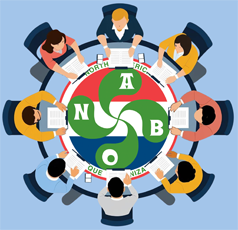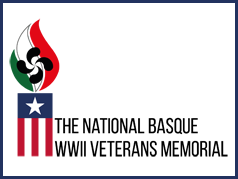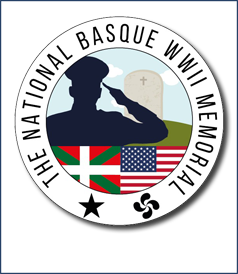Astero
Euskara as a Secret Passage
In the Guggenheim Bilbao Museum there's a permanent exhibit by Jenny Holzer that reveals how Euskara (Basque language) serves as a secret passage of sorts, a unique window into a world that at first glance many might miss.

One of the more profound exhibits at the Guggenheim Bilbao Museum is one designed by Jenny Holzer (b. 1950, Gallipolis, Ohio, U.S.A.). It consists of columns of scrolling words in English with red lights, that when first seen appear to be up against a dark wall. But if one moves closer, you find that the nine LED light columns are actually double-sided and in front of the wall. Stepping through the light columns you turn to find scrolling words on the back-side of the columns, but this time in blue lights and in the Basque language (as seen in the image above).
It is a perfect metaphor for Basque culture because in many ways the world of the Basques remains hidden from view. To ultimately discover that world one needs to know Euskara or the Basque language.
Now this statement is controversial, because some might be offended that their "Basqueness" is being called into question, while others might feel bad that they don't know Basque. For the former, the response is a matter of reason. Many a visitor or tourist to the Basque country might know they are in the Basque country and take in some of its charms, but there is larger world that the non-speakers of Basque are likely to miss. Just like the example above, one might think they have seen--or know--all there is about the Basque Country, and that the "lights end at the wall." But if one moves closer and passes through the metaphorical columns into the Basque-speaking world, things show up, in a matter of speaking, as a different color. The reason for this, is that some things in life just don't translate. Each of the world's languages have their own internal dynamic. Ask anyone who is more than monolingual and nine of ten will tell you the same: each language carries its own unique, cultural attributes; i.e., we communicate (i.e., relate, connect, understand) differently with people in different languages, and it is not just because the words sound or are spelled different.
"Hizkuntza bakoitza mundua ikusteko era desberdin bat dela."
-Federico Fellini
For the latter--those who feel bad that they don't know Basque because they too would like to know that "hidden world," well there is good news for you! There's never a time like the present to follow through on what you've always told yourself: "I wish I knew Basque." There are opportunities out there now that make learning easier, including classes at Basque clubs and now an online option as well.
NABO is committed to trying to keep the "lights on the other side of the columns." As one of the world's most distinctive minority languages, Euskara's future will be decided by the current generation of speakers: those who know the language and continue to use it, and those who step up and make an effort to learn. We need your help to keep our language "visible, viable & vital". And believe it when you hear it: it's a pretty nice world on the other side of the columns. You'll like it too!



















































































































